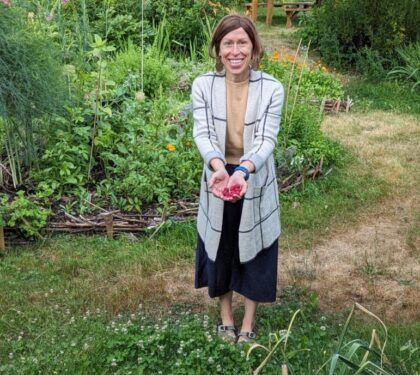AFT’s Pacific Northwest Region Releases Solar Leasing: A Guide for Agricultural Landowners in the Pacific Northwest
(Bellingham, WA) — The American Farmland Trust’s Pacific Northwest team announced the release of a comprehensive solar leasing guide for farmers, ranchers, and agricultural landholders, which provides agricultural landowners with tools and information to better understand the emerging solar development field and its potential to impact agricultural land.
Solar Leasing: A Guide for Agricultural Landowners in the Pacific Northwest was written in collaboration with Farm Commons, a nonprofit specializing in legal advice for farmers and ranchers. Divided into three sections, the guide walks landowners through the process of I) Gathering Information, II) Making a Decision, and III) Negotiating the Solar Lease. Additional support for the guide specific to agrivoltaics was provided by Oregon State University’s Nexus of Energy, Water and Agriculture Laboratory.
Solar development is on the rise in the Pacific Northwest, as Washington and Oregon take steps to reach ambitious clean energy goals. Agricultural land can be seen as a prime location for solar development, as it is typically undeveloped, flat, treeless and close to transmission infrastructure. While solar leases can be a new source of income for agricultural landowners, they can also carry significant risks and last upwards of 30 years. Solar installations can have significant impacts on the land, including soil compaction and disturbance, which can limit future agricultural production. They also have potential to impact surrounding land and communities, disrupting wildlife corridors and viewsheds. Additional risks for farmland owners include liability insurance, loss of water rights and impacts to succession planning.
“We are deeply grateful to USDA-NIFA and the Western Extension Risk Management Education Center for providing us with the opportunity to develop this guidebook,” said Addie Candib, AFT’s regional director for the Pacific Northwest. “Renewable energy development is one of the most important issues facing our region, and agricultural landowners have an important role to play. With this project, we are creating resources that will help farmers and ranchers feel informed and empowered to advocate for themselves, their operations, and their land.”
By helping landowners understand the full array of these risks and equipping them with the tools and skills to evaluate whether solar leases are right for them, the guide and the corresponding workshops will prepare landowners to make informed decisions, anticipate production losses, and avoid costly legal conflicts.
Questions can be sent to Chantel Welch, PNW Project Manager ([email protected]). Download the Solar Leasing Guidebook here.
This project is supported by USDA/NIFA under Award Number 2021-70027-34713.
###
American Farmland Trust is the only national organization that takes a holistic approach to agriculture, focusing on the land itself, the agricultural practices used on that land, and the farmers and ranchers who do the work. AFT launched the conservation agriculture movement and continues to raise public awareness through our No Farms, No Food message. Since our founding in 1980, AFT has helped permanently protect over 6.8 million acres of agricultural lands, advanced environmentally-sound farming practices on millions of additional acres and supported thousands of farm families.




